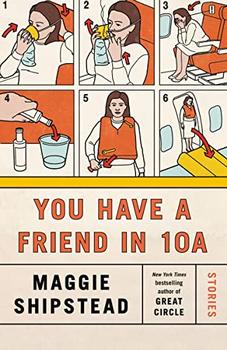Summary | Excerpt | Reviews | Beyond the Book | Read-Alikes | Genres & Themes | Author Bio

Stories
by Maggie ShipsteadThis article relates to You Have a Friend in 10A
 Maggie Shipstead was known as a novelist before releasing her first short story collection, You Have a Friend in 10A. A number of its stories date back 10 or more years, though, some having been written while she was a student at the Iowa Writers' Workshop and a Wallace Stegner Fellow at Stanford. The individual stories originally appeared in publications such as Guernica, Tin House and VQR (the Virginia Quarterly Review). So, what goes into the decision to publish a novel or a short story collection first?
Maggie Shipstead was known as a novelist before releasing her first short story collection, You Have a Friend in 10A. A number of its stories date back 10 or more years, though, some having been written while she was a student at the Iowa Writers' Workshop and a Wallace Stegner Fellow at Stanford. The individual stories originally appeared in publications such as Guernica, Tin House and VQR (the Virginia Quarterly Review). So, what goes into the decision to publish a novel or a short story collection first?
For authors, short stories can be a way to practice all the skills that go into novel-writing, such as dialogue, scene-setting, characterization, plotting and the use of voice. A piece can be finished, polished and published within a much shorter space of time, giving writers the chance to get their work out into the world. This allows them to start amassing a following and make a bit of money, perhaps while working on a longer project.
A short story might even contain an idea that could be expanded into a novel. Write with Excellence blogger N. J. Lindquist puts it colorfully: "Writing a novel before you've written some short stories is like marrying the first person you date. Usually, it's better to meet a few people before you make a commitment. Writing a number of short stories in a variety of genres will help you hone in on both what you enjoy and what you write best."
Having a track record of publication in literary magazines gives any budding author a leg up. According to Writer's Relief, "The writers who are most likely to score a paying book deal are usually those who have already built up their reputations via literary magazine publications."
Still, it's received wisdom that short stories themselves don't sell well. BookScan data suggests that when it comes to books from major publishers, story collections sell about half as many copies as novels. However, short fiction has a history of being venerated in the United States. Nine short story collections have won the Pulitzer Prize, including Interpreter of Maladies by Jhumpa Lahiri in 2000, as well as the linked story volumes Olive Kitteridge by Elizabeth Strout and A Visit from the Goon Squad by Jennifer Egan in 2009 and 2011, respectively. Story collections also won the National Book Award in 2014 and 2015 (Redeployment by Phil Klay and Fortune Smiles by Adam Johnson).
Every few years, it seems, a short story collection wins a major prize, or a single story makes headlines (like Kristen Roupenian's 2017 viral New Yorker story "Cat Person"), leading commentators to herald the "revival" of the genre. Curtis Sittenfeld weighed in on this in 2018 when she released her first story collection, You Think It, I'll Say It: "for people who like short stories, short stories are always having a moment. There are always interesting, innovative, dynamic stories being written and being published. They're not always being prominently published, but they're being published."
Like Shipstead, Sittenfeld published multiple novels before collecting her short stories. Many other authors have published at least one novel before a story collection (Chimamanda Ngozi Adichie, Emma Cline, Lauren Groff, Zadie Smith, Brandon Taylor), while plenty of authors who debuted with story collections have gone on to success with novels (Ian McEwan, Kirstin Valdez Quade, Karen Russell, Bryan Washington, Claire Vaye Watkins).
Ultimately, short fiction is a unique art form, forcing conciseness and honed prose. Whether authors write short stories only occasionally — as a break from longer works or as intentional practice — or prioritize publishing them, they prompt different questions than novels about marketability, practicalities and literary expression.
Person using laptop, by Christin Hume
Filed under Books and Authors
![]() This "beyond the book article" relates to You Have a Friend in 10A. It originally ran in July 2022 and has been updated for the
April 2023 paperback edition.
Go to magazine.
This "beyond the book article" relates to You Have a Friend in 10A. It originally ran in July 2022 and has been updated for the
April 2023 paperback edition.
Go to magazine.
Your guide toexceptional books
BookBrowse seeks out and recommends the best in contemporary fiction and nonfiction—books that not only engage and entertain but also deepen our understanding of ourselves and the world around us.